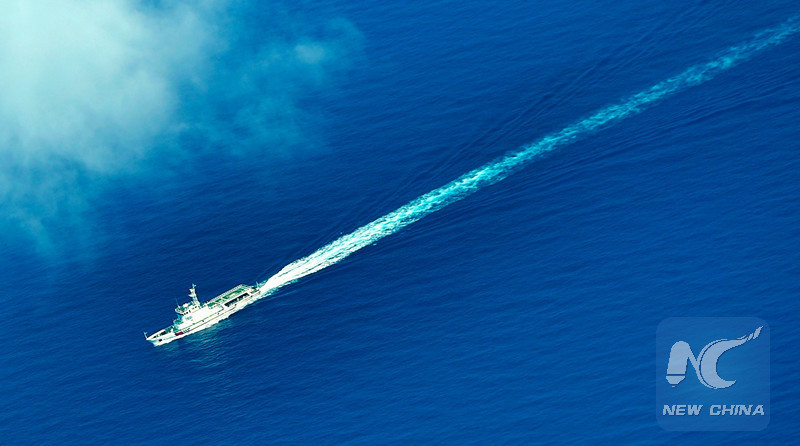


An aerial photo taken on Sept. 25, 2015 from a seaplane of Hainan Maritime Safety Administration shows cruise vessel Haixun 1103 heading to the Yacheng 13-1 drilling rig during a patrol in south China Sea. (Xinhua/Zhao Yingquan)
BERLIN, June 5 -- Philippines' assertion concerning the South China Sea (SCS) abused the international law and the United States' interference is only a show of hegemony that does no good to anybody, Chinese overseas scholars said Sunday at a seminar in Berlin.
The seminar, themed "The South China Sea Issue: China's Stance, International Voice", gathered several Chinese overseas scholars in Germany, The Netherlands and other European countries.
It was also attended by more than 50 representatives of Chinese students studying in Berlin, Chinese enterprises and overseas Chinese living in Germany.
Noting the SCS case unilaterally initiated by the Philippines in 2013, Qiu Rungen, visiting scholar at Berlin's Humboldt University and an expert on international economic law, said that such an arbitration, though deliberately wrapped up, actually violates the legislative purpose of the United Nations Convention on the Law of the Sea (UNCLOS) and its juridical logic.
In fact, China and the Philippines have agreed in bilaterally-signed documents to settle SCS disputes through dialogues and negotiations. Additionally, China made a declaration in 2006 that excluded a compulsory arbitration under Article 298 of the UNCLS.
Given these facts, Qiu said that China's assertion of neither accepting nor participating in the SCS arbitration is not only fully in line with the UNCLOS but also meets the basic legal principle of international laws.
It's evident that the Philippines has abused the legal procedure to initiate the unilateral arbitration and the international tribunal's jurisdiction over the case was marred with nomological bias, said Luo Gang, a doctoral student specialized in international law in Germany.
The SCS international arbitration tribunal in The Hague announced its jurisdiction over the case in October 2015, and prepares to deliver a ruling in the next few months. However, the combination of the tribunal and its judging process are questioned by a number of Chinese and international scholars.
The U.S. role messing up the SCS was also discussed by the Chinese scholars.
The United States has made a series of harsh rhetoric on the SCS issue, mostly accusing China of threatening the freedom of navigation, while it itself exercised several military operations by closely flying or sailing past South China Sea islands, violating China's sovereign rights and adding tension to the region.
The arbitration case shows that the United States can not tolerate the rise of China and has fancied China's development a challenge to the America-dominated international order, Humboldt University Law doctoral student Li Ke pointed out.
U.S. words and deeds expose once again that the American hegemony is accustomed to use so-called "rules" to pursue power politics, Li added.
The Chinese scholars attending the seminar all agreed that the "disputed" Nansha Islands have long been part of the Chinese territory, which is not only supported by numerous historical evidence since ancient times, but also by the many international treaties from modern times.
They voiced opposition to the Philippines' illegal seizure of China's Nansha Islands and reefs, calling for more support to safeguard the international law and the legal interest of China.
Chinese overseas scholars should help to have more voices from China heard on the international arena for a peaceful resolution of the South China Sea disputes, said Wang Qi, doctoral candidate for law at the Free University of Berlin, who is also an organizer of the seminar.
 French girl ties the knot with Chinese boy
French girl ties the knot with Chinese boy Beijing Style: Hot pants
Beijing Style: Hot pants Century-old station sees railyway evolution
Century-old station sees railyway evolution Enthusiasts perform Kung Fu at Wudang Mountain
Enthusiasts perform Kung Fu at Wudang Mountain Students take stylish bikini graduations photos
Students take stylish bikini graduations photos Charming dancing students pose for graduation photos
Charming dancing students pose for graduation photos China opens its first combined transport service to Nepal
China opens its first combined transport service to Nepal Naked models transformed into landscapes, birds and even DRAGONS by body painting artist
Naked models transformed into landscapes, birds and even DRAGONS by body painting artist China's first interactive robot looks like a beauty
China's first interactive robot looks like a beauty Top 20 hottest women in the world in 2014
Top 20 hottest women in the world in 2014 Top 10 hardest languages to learn
Top 10 hardest languages to learn 10 Chinese female stars with most beautiful faces
10 Chinese female stars with most beautiful faces China’s Top 10 Unique Bridges, Highways and Roads
China’s Top 10 Unique Bridges, Highways and Roads Citizens of the world
Citizens of the world Gaokao cheaters to face criminal charges
Gaokao cheaters to face criminal charges ‘No fear of trouble’ in S.China Sea top PLA official
‘No fear of trouble’ in S.China Sea top PLA official New Chinese TV series breaks nation’s silence on the Korean War
New Chinese TV series breaks nation’s silence on the Korean WarDay|Week